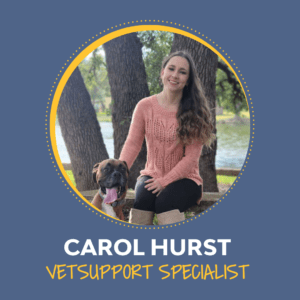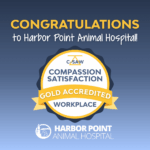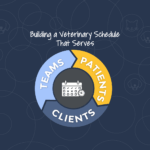By Carol Hurst, LVT, CVPM, CVJ, CCFP, VetSupport Specialist
Servant Leadership is one of my favorite topics to talk about. This style of leadership serves our veterinary hospitals well but is often the last thing we think about when putting a new leader into their position. Often, we think that a highly skilled CSR or a mega efficient technician would make an excellent leader. While they can be successful, we set them up to fail straight out of the gate if the only leadership skills we look at are those hard skills that make them a successful patient care team member or client care specialist. We must seek out and develop the soft skills that are vital for a servant leader.
The concept of servant leadership encompasses the mindset that you care for your People First. That you are there to “serve” them and by doing so, it will benefit the organization as a whole. Traditional leadership focuses on the idea that there is one supreme power at the top from which everything else trickles down. Servant-leadership is a collaboration, a sharing of that power. It is the idea that you put the needs of your team first, develop and help them grow.
These are the characteristics that should be targeted and developed in individuals who will be put into a leadership position.
- Listening – While this seems rudimentary, a lot of us do not have great listening skills. We are often listening to be heard rather than listening for understanding or clarity.
- Stewardship – Being a good role model to your team is arguably a backbone principle. You can’t just speak your practice’s values – you must live them.
- Empathy – Can you view situations from another’s lens? Even (especially) when it is someone you can’t relate to or agree with? This skill is immeasurable in its benefit to the leader. If you can be open-minded to the individual sitting across from you without drowning in their emotions it will make for better decision-making, connection and trust.
- Building Community – Servant leaders bring people together in impactful ways. Likewise, a strong retention strategy for practices is to build a community within their practice that offers support, camaraderie and connection to the team.
- Awareness – You can’t manage others until you can manage yourself. Truer words were never written. Do you know how your behaviors impact those around you? For most of us, this will be a life-long journey. For a leader, it is imperative that you understand your impact and are vulnerable enough to admit to missteps when they happen.
- Commitment to the Growth of People – Many leaders get into the position for the wrong reasons. They want the title of manager, the prestige of being a leader or even the financial gain or other perks associated with the position. If your main motivation are any of these things, it is going to be impossible for your team to thrive. We need leaders who build other leaders. You must be invested in facilitating the growth of your team.
- Healing – Servant Leaders are skilled at mending relationships between individuals. This is very much an art and not an exact science. It takes connecting with others, building safety and developing trust.
- Persuasion – This word often has a negative connotation but your role as a leader is to communicate the values and mission to the team. Winning “hearts and minds” to the greater cause and being a positive catalyst for change require a persuasive technique.
- Foresight – The next two are great for future-planning. Can you take all relevant variables and make predictions for the future of the practice? This is an essential skill for business management.
- Conceptualization – This is a bit of a mixture of dreaming for the future and strategic planning. Can you take a step back away from the “day to day,” dream big goals and then take steps to achieve them?
As you look to grow leaders on your veterinary team, perhaps incorporating the fundamentals of servant leadership will help lift, grow, and support those team members to even greater heights than once thought possible.

VetSupport Specialist
Carol.Hurst@encorevet.com





